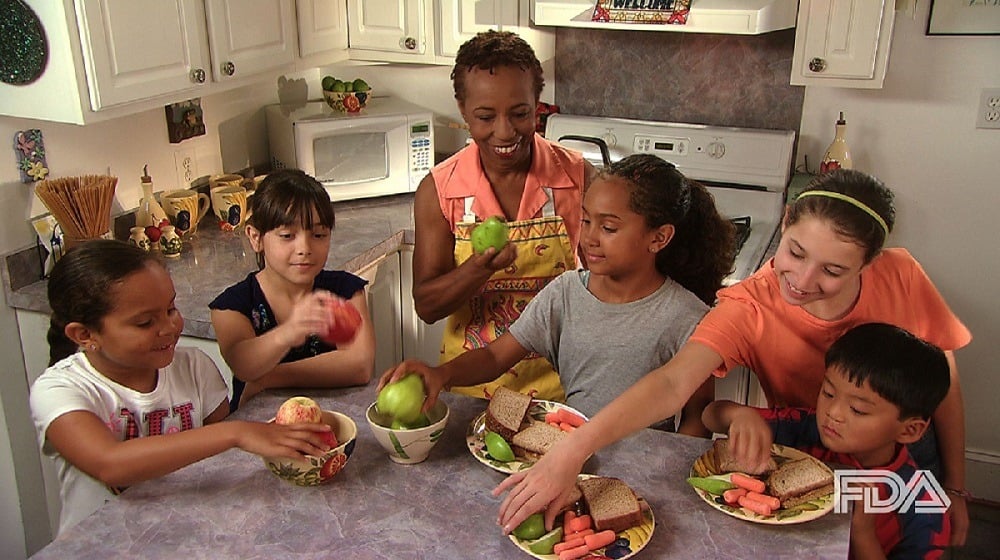Commenting On Your Child's Weight Can Bring Terrible Results, Study Finds
Childhood obesity is a major problem currently facing our nation today. The statistics are staggering. According to the Centers for Affliction Command (CDC), in the past 30 years the obesity charge per unit in children has doubled, and quadrupled in teens. The health chance associated with children who develop issues with their weight early are astronomical.
Nearly parents may not fully understand all of the health issues stemming from babyhood obesity. But most are concerned with the overall well-being of their children and are enlightened that being overweight is unhealthy and carries consequences.
How a parent approaches this result is of the utmost importance. So earlier telling your child that they are looking a footling "thick" or "chunky," hither are a few things you may want to consider.
Dealing with a child's weight can exist a touchy subject

Should parents talk to an overweight or obese kid about their weight? Or practise they say nothing? Parents in this state of affairs tin can really be torn. On one mitt, if they do say something they run the risk of shaming a child, damaging their child'due south self esteem and distorting his or her body image. This can lead to eating disorders, binge eating, depression and other psychologically dissentious issues. On the other manus, if they choose to say naught, they are missing an opportunity to assist prevent their child from having potentially serious and long-term wellness problems.
A new report offers this guidance: Don't make comments about a kid's weight.
Researchers did not distinguish betwixt positive or negative comments in the study published in the periodical Eating & Weight Disorders, because they found that any comment a child (especially girls) remembered hearing about their weight predicted a heavier body mass alphabetize and more overall dissatisfaction with their torso type–even if weight was not an outcome.
Other studies accept been able to link the critical comments of parents to an increased risk of obesity. One large government-funded report that followed thousands of 10-year-old girls found that, at the start of the written report, nearly 60 percent of the girls said an adult shut to them had told them they were "too fat." By age 19, those who had been saddled with that label were more than probable to be obese, regardless to whether or not they were actually overweight when they were 10.
In an interview with The Guardian, Dr. Rachel Rodgers, acquaintance professor at the section of applied psychology at Northeastern University in Boston, put information technology this way:
"Parents should avoid commenting on their children's weight or advent: that includes criticism, teasing, or even 'positive' statements. They should avoid encouraging their children to diet, or suggesting they demand to lose weight. They should avoid 'not allowing' certain foods, telling their children that certain foods are 'bad' or trying to restrict their children's diets."
Dr. Rodgers went on to convey the idea that in the minds of children weight and their physical appearance becomes associated with their cocky-worth and how they value themselves as a person.
How to approach the issue of children, weight and your concerns

Experts propose a more delicate and indirect approach when dealing with issues of children weight concerns and getting them to eat healthier.
one. Model healthy eating
Sit down and eat meals with your kid whenever possible. When you are watching Idiot box with them, ready yourself (and them) a healthy snack. Model skillful portion control and how to stop eating once you've had plenty
2. Avoid rewarding and punishing with nutrient
Try to avoid labeling foods as proficient or bad. Find new ways to advantage your children for good grades or other major accomplishments. Instead of going for ice cream, allow them option a fun activity to do. And in lieu of letting them pick the restaurant to celebrate, permit them to select the movie for movie night.
iii. Allow them to help you set meals
Preparing healthy meals with your children is a not bad way to bond and model healthy alternatives. Information technology is also a great way to talk over how to make healthy food choices.
4. Avert dieting in front end of them and refrain from suggesting that they go on a diet
If you make up one's mind to go on a nutrition, you may not want to share the details with your children. Also, exist conscientious how you lot frame your responses. Instead of maxim you lot are dieting to fit into a dress or look improve, yous may want to tell them y'all are trying to adopt a healthier lifestyle.
Featured photo credit: Jeri Johnson via stocksnap.io
whitehousecauns1945.blogspot.com
Source: https://www.lifehack.org/419198/commenting-on-your-childs-weight-can-bring-terrible-results-study-finds
0 Response to "Commenting On Your Child's Weight Can Bring Terrible Results, Study Finds"
Publicar un comentario